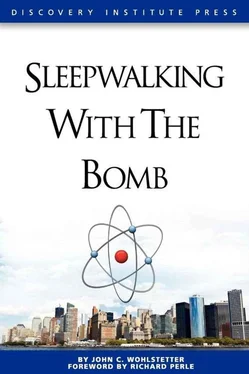John Wohlstetter - Sleepwalking with the Bomb
Здесь есть возможность читать онлайн «John Wohlstetter - Sleepwalking with the Bomb» весь текст электронной книги совершенно бесплатно (целиком полную версию без сокращений). В некоторых случаях можно слушать аудио, скачать через торрент в формате fb2 и присутствует краткое содержание. Город: Seattle, Год выпуска: 2012, ISBN: 2012, Издательство: Discovery Institute Press, Жанр: История, military, Политика, Публицистика, на английском языке. Описание произведения, (предисловие) а так же отзывы посетителей доступны на портале библиотеки ЛибКат.
- Название:Sleepwalking with the Bomb
- Автор:
- Издательство:Discovery Institute Press
- Жанр:
- Год:2012
- Город:Seattle
- ISBN:978-1-93659-906-6
- Рейтинг книги:3 / 5. Голосов: 1
-
Избранное:Добавить в избранное
- Отзывы:
-
Ваша оценка:
- 60
- 1
- 2
- 3
- 4
- 5
Sleepwalking with the Bomb: краткое содержание, описание и аннотация
Предлагаем к чтению аннотацию, описание, краткое содержание или предисловие (зависит от того, что написал сам автор книги «Sleepwalking with the Bomb»). Если вы не нашли необходимую информацию о книге — напишите в комментариях, мы постараемся отыскать её.
RICHARD PERLE, Resident Fellow, American Enterprise Institute and Assistant Secretary of Defense, 1981–1987 Sleepwalking with the Bomb
Sleepwalking with the Bomb — читать онлайн бесплатно полную книгу (весь текст) целиком
Ниже представлен текст книги, разбитый по страницам. Система сохранения места последней прочитанной страницы, позволяет с удобством читать онлайн бесплатно книгу «Sleepwalking with the Bomb», без необходимости каждый раз заново искать на чём Вы остановились. Поставьте закладку, и сможете в любой момент перейти на страницу, на которой закончили чтение.
Интервал:
Закладка:
On July 26, 1956, Nasser nationalized the Suez Canal and closed it, cutting off the only short sea transit route from Europe to Asia. Britain and France, among those who relied on the canal to save months of shipping transit time for cargo from Asia, allied themselves with Israel to topple Nasser. Their plan was to invade the Sinai Desert. British and French forces would seize the Suez waterway, blockade key Egyptian ports, and conduct aerial bombardment. They would give Nasser an ultimatum: withdraw from the Suez Canal Zone or lose power.
In too-clever-by-half timing, the momentous, ill-starred operation began October 29, one week before the American presidential election. America was supposed to be distracted by its upcoming presidential election and surely would not oppose the takedown of a virulently anti-American, charismatic Arab demagogue and Soviet client. Instead, on November 6, the day of his landslide reelection, Eisenhower condemned the operation.
In a bizarre coincidence that compounded Eisenhower’s fury at the three allies, Hungarians were in the midst of a revolt against Soviet rule. Eisenhower was utterly impotent in the Hungarian crisis. Russian artillery took commanding heights and tanks rumbled in the streets of Budapest, against which Hungarians had small arms, virtually no artillery, no tanks, and at best “Molotov cocktails”—bottles filled with kerosene and lighted with a wick, tossed at Russian armor and Soviet buildings. Moscow brutally suppressed the revolt on November 10.
Eisenhower’s impotence in Hungary was not replicated in the Mid-east, and his decision to sandbag key allies was fateful and disastrous for the West. On November 8 the Soviets warned the British, French, and Israeli invaders to pull back or else face retaliation. Strategic bombers armed with nuclear weapons backed their threat. Had it been hit by three Russian hydrogen bombs, the State of Israel would have virtually ceased to exist. And the Soviets had the power to inflict upon England and France vastly greater devastation than did the Germans in World War II.
The three countries were left to fend for themselves against the Soviets because Eisenhower feared losing support in the Arab world if he allowed the invasion to proceed. And as superpower guarantor, via NATO membership, to Britain and France (it was not until 11 years later that America and Israel entered into a formal alliance), he did not want to be drawn into a possible nuclear confrontation with Russia.
Without U.S. support, and only Britain armed with nuclear bombs—few, at that—the three countries had no practical choice but to capitulate to the Soviets.
On November 30, 1956, the frustrated France and Israel made their first nuclear weapons development pact. The next year, the French agreed to help Israel build a nuclear plant at Dimona, in Israel’s Negev Desert.
The French-Israeli nuclear collaboration lasted only until May 1960. Charles de Gaulle ended it shortly after he returned as president of what remains today France’s Fifth Republic. But the work went on, and Israel made a clandestine deal for heavy water, used to produce nuclear fuel, from Norsk Hydro, a huge Norwegian company. [40] It was Norsk Hydro that during World War II manufactured heavy water for the Nazis. The Allies so feared the prospect of a Nazi bomb that they destroyed the factory and later, after centrifuges were replaced, sank a ferry carrying heavy water as it began a journey to Germany. Fifty-three civilians were on the ferry, some of whom drowned. The story is told in the suspenseful 1965 action film The Heroes of Telemark.
In December 1960, on the cusp of John F. Kennedy’s inauguration, Israel’s program became public knowledge. Kennedy pressed Israel hard to allow inspection of its Dimona facility, but Israel resisted. In an April 2, 1963, Oval Office meeting, Israel’s then-Deputy Foreign Minister, Shimon Peres, offered Kennedy what was to become the permanent formulation for Israel as to its nuclear program: Israel would not be the first nation to introduce nuclear weapons into the Middle East. (The key word is weapons , which Israel clearly restricts to meaning a fully assembled weapon . Having components that can be rapidly assembled into a bomb does not qualify as actually introducing weapons under this formulation.)
The Dimona reactor began operation—in nuclear parlance “went critical”—in December 1963. Ironically that same year Nasser was helping to midwife the Palestine Liberation Organization, which would come to pose an existential terrorist threat to Israel’s future, one not anticipated by Israel’s focus on a nuclear deterrent.
Sometime between December 1963 and the June 1967 start of the Six-Day War, Israel completed all the steps necessary to rapidly assemble a nuclear device. (The time needed to assemble a usable bomb is short. Final assembly of the primitive Nagasaki implosion A-bomb in August 1945 took less than one day. Assembling a gun-trigger device would be even quicker.) Two prototype devices may have been ready for use in 1967, during the Six-Day War. By then Lyndon Johnson was president and looking to run again in 1968. With a close election expected in the fall, the Jewish vote took center stage, and New York’s then-45 electoral votes were crucial. Johnson told his staff with the plain-speak he was known for: “Good nonproliferation policies lead to bad politics.” [41] Ultimately Johnson decided not to run again, but in any case, his warm support for Israel went beyond politics to religious identity. LBJ was a Christadelphian; the sect believes that the Kingdom of God will be seated on Earth in Jerusalem. LBJ also forged a warm bond with fellow farmer Levi Eshkol, Israel’s Prime Minister.
The Fallout from Suez
THE TURN at Suez proved among the most catastrophic miscalculations in American foreign policy history. In condemning Nasser’s enemies and allowing Nasser to proceed unchecked, the United States tossed away the chance to crush Nasser and nip pan-Arabism in the bud. In 1958, the radical passions Nasser stirred up in the Arab world bore ugly fruit, with Egypt-sponsored revolution in Iraq, soon followed by revolution in Syria. These uprisings brought a pair of secular militarist tyrannies to power and destroyed French and British influence there.
These revolutions destroyed what was left of the power of pro-Western moderates. Along with the 1963 founding of the Palestine Liberation Organization, these events set in motion a cascade of Mideast calamities over the ensuing decades. Had the United States used its superpower status to protect the interests of its close allies in 1956, these calamities—briefly described below—might have been avoided entirely, or at least, their impact blunted.
On New Year’s Day 1965 the PLO launched its first attack against the Jewish state—one aimed at “liberating” not the West Bank, then occupied by Jordan, or Gaza, then under Egyptian suzerainty, but Israel, from democratic Jewish status. While the Palestinians had chafed under Arab rule few outside the region had cared. Nor had there been serious international talk about their “national historic rights.” [42] Indeed, in September 1970 Jordan’s King Hussein (whose son Abdullah now rules the kingdom) decided to end Palestinian unrest inside Jordan by driving the Palestinian Liberation Organization military units out of the West Bank and into Lebanon. Jordan’s British-trained army slaughtered thousands of PLO fighters and West Bank civilians. One of the terrorist groups took the name “Black September” after the debacle. The world stood mute. Israel warned off Syria and Iraq.
But Nasser’s post-Suez decade of agitation against Israel’s right to exist (a point of view then held unanimously by Mideast Arab countries) led to the Six Day War, and that changed Palestinian politics. It was only when Israel occupied the West Bank and Gaza after the 1967 war that the plight of the Palestinians became a staple of international politics.
Читать дальшеИнтервал:
Закладка:
Похожие книги на «Sleepwalking with the Bomb»
Представляем Вашему вниманию похожие книги на «Sleepwalking with the Bomb» списком для выбора. Мы отобрали схожую по названию и смыслу литературу в надежде предоставить читателям больше вариантов отыскать новые, интересные, ещё непрочитанные произведения.
Обсуждение, отзывы о книге «Sleepwalking with the Bomb» и просто собственные мнения читателей. Оставьте ваши комментарии, напишите, что Вы думаете о произведении, его смысле или главных героях. Укажите что конкретно понравилось, а что нет, и почему Вы так считаете.












